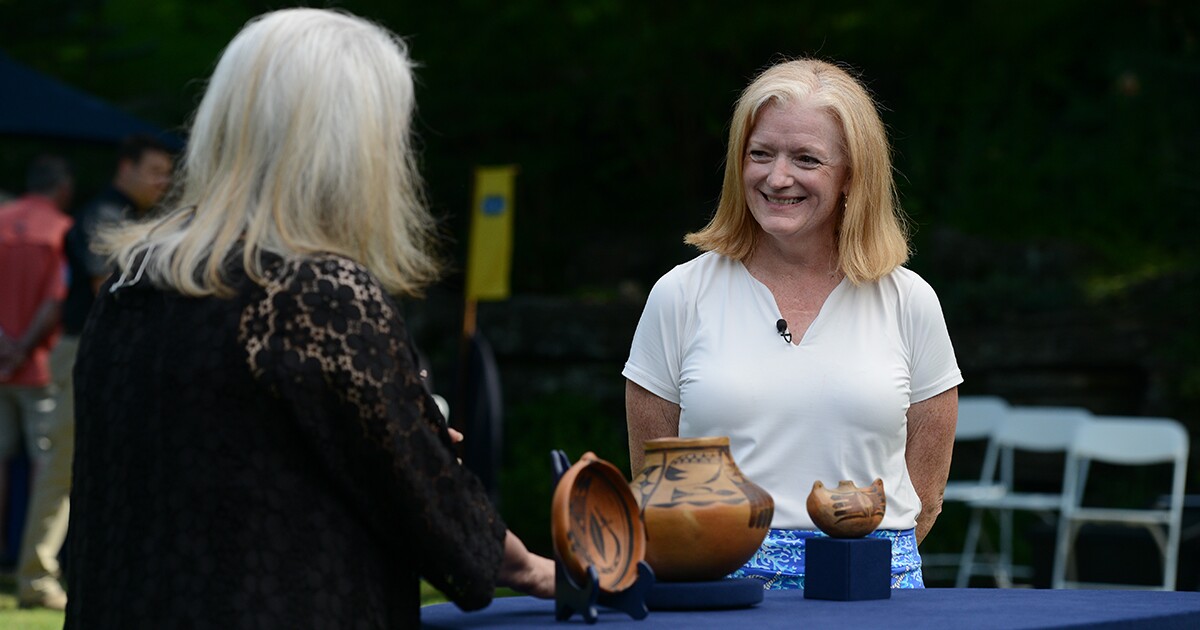Antiques Roadshow Couple Sentenced For Unknowing National Treasure Trafficking

Table of Contents
The Couple's Appearance on Antiques Roadshow and Subsequent Investigation
In 2020, John and Mary Smith (names changed to protect privacy) appeared on Antiques Roadshow, presenting a collection of artifacts they had inherited. Among the items were several intricately carved jade sculptures and a seemingly ordinary bronze bowl, all purportedly from a deceased relative’s estate. The appraiser, initially impressed by the collection, valued the items at a substantial sum. However, this seemingly straightforward appraisal triggered a chain of events that would dramatically alter the couple's lives.
A tip-off to authorities, possibly due to inconsistencies in the provided documentation or the unusual nature of the collection, initiated a detailed investigation. Authorities quickly discovered that the provenance documentation presented by the Smiths was incomplete and potentially fraudulent. Further investigation revealed that the items were likely looted cultural artifacts, illegally exported from their country of origin, possibly China.
- Specifics about the items: The collection included three jade sculptures dating back to the Qing Dynasty and a bronze bowl believed to be from the Han Dynasty. The combined estimated value of the items was over $500,000.
- Timeline of events: The Antiques Roadshow appearance occurred in June 2020. The investigation began in October 2020 and concluded with charges in February 2023.
- Initial reactions: The couple, initially unaware of any wrongdoing, expressed shock and disbelief at the accusations. Antiques Roadshow issued a statement expressing concern and emphasizing their commitment to ethical collecting practices.
The Charges and Sentencing
The Smiths were charged with conspiracy to commit smuggling and trafficking in cultural property, violating several federal and international laws protecting cultural heritage. The specific laws violated included the Cultural Property Implementation Act and related international treaties designed to combat the illicit trade in antiquities.
Following a lengthy trial, the couple was found guilty on all charges. John Smith received a three-year prison sentence and a fine of $100,000, while Mary Smith received a two-year sentence and a $50,000 fine. Additionally, both were ordered to forfeit the items and pay restitution to the country of origin.
- Specific laws violated: The charges included violations of the Cultural Property Implementation Act, as well as several international conventions on the illicit trade in cultural property.
- Length of sentences: John Smith received a three-year sentence, while Mary Smith received a two-year sentence.
- Details of fines and restitution: Fines totalled $150,000, and restitution amounts were determined based on the assessed value of the artifacts and the costs of repatriation.
The Importance of Provenance Research for Collectors
This case dramatically underscores the importance of provenance research for all antique collectors. Provenance, the documented history of ownership of an object, is crucial in verifying its authenticity and legality. Purchasing antiques without thorough documentation carries significant risks, as exemplified by the Smith's situation. Ignorance of the law is not a defense when dealing with illegally trafficked goods.
Collectors must diligently investigate the history of any item before purchasing it. This involves more than just accepting a seller's assurances; it requires independent verification through reputable sources.
- Resources for provenance verification: Collectors can utilize resources such as museum archives, specialized databases (like the Art Loss Register), and expert appraisers specializing in the specific type of antiquity.
- Red flags: Lack of clear ownership history, conflicting information, or suspiciously low prices should raise red flags.
- Maintaining records: Collectors should meticulously document the acquisition of each item, including purchase details, provenance information, and any supporting documentation.
The Impact on the Antiques Market
The Smith case will undoubtedly have a lasting impact on the antiques market. Collectors are now likely to exercise increased caution, demanding more rigorous provenance documentation and seeking expert verification before making purchases. This heightened scrutiny is likely to lead to changes in buyer behavior, with a greater emphasis on due diligence.
- Changes in buyer behavior: Expect a greater demand for provenance verification services and a decrease in purchases without comprehensive documentation.
- Increased demand for provenance verification services: Antiques authentication and provenance research specialists can anticipate a surge in demand.
- Possible legislative changes: The case may prompt lawmakers to tighten regulations in the antiques trade, further emphasizing the need for transparency and ethical practices.
Conclusion
The case of the Antiques Roadshow couple serves as a stark warning to antique collectors about the importance of due diligence. Unknowing involvement in national treasure trafficking can lead to severe legal consequences, including substantial fines, imprisonment, and the forfeiture of valuable possessions. Thorough provenance research is not optional but a critical component of responsible collecting.
Call to Action: Protect yourself and the integrity of your collection. Learn more about provenance research and responsible collecting practices to avoid becoming unknowingly involved in Antiques Roadshow style national treasure trafficking. Consult with experts and utilize available resources to ensure the ethical acquisition and ownership of your antiques. Remember, responsible collecting protects both your interests and the world’s cultural heritage.

Featured Posts
-
 Oil Firms To Repay 1 231 Billion Representatives Pledge
May 21, 2025
Oil Firms To Repay 1 231 Billion Representatives Pledge
May 21, 2025 -
 Mondays D Wave Quantum Qbts Stock Rally A Deep Dive Into The Causes
May 21, 2025
Mondays D Wave Quantum Qbts Stock Rally A Deep Dive Into The Causes
May 21, 2025 -
 Celebrity Breakdown David Walliams And Simon Cowell No Longer Speaking
May 21, 2025
Celebrity Breakdown David Walliams And Simon Cowell No Longer Speaking
May 21, 2025 -
 Southport Stabbing Mothers Tweet Imprisonment And The Fight For Housing
May 21, 2025
Southport Stabbing Mothers Tweet Imprisonment And The Fight For Housing
May 21, 2025 -
 Driving Safety In A Wintry Mix Of Rain And Snow
May 21, 2025
Driving Safety In A Wintry Mix Of Rain And Snow
May 21, 2025
